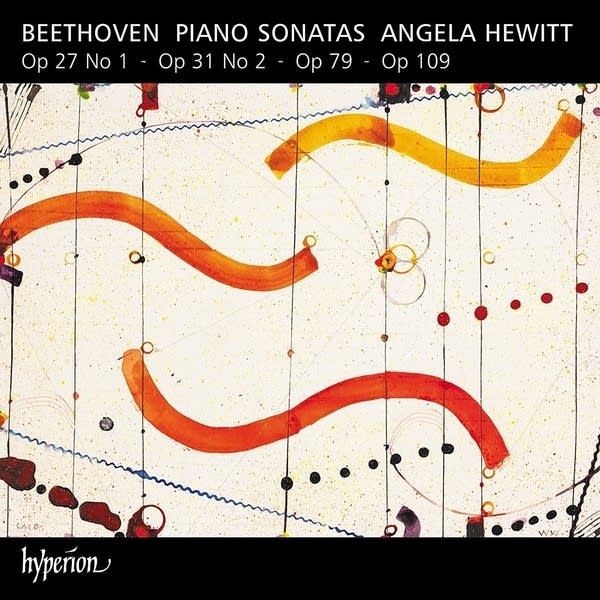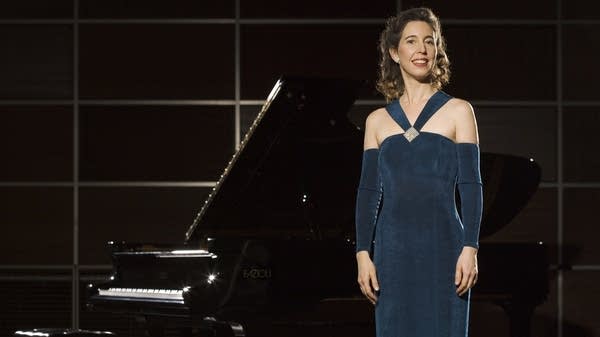Angela Hewitt: Beethoven Piano Sonatas Op. 27 No. 1, Op. 31 No. 2, Op. 79, Op. 109 (Hyperion)
Angela Hewitt is marking several milestones this year. She's in the middle of her Bach Odyssey tour, a four-year mission to perform all of Bach's piano works. On June 2, she'll receive a Governor General's Performing Arts Award for lifetime achievement in her Canadian homeland. And, in July, she celebrates her 60th birthday with a recital at London's Wigmore Hall, where she'll play her signature work, Bach's Goldberg Variations.

"I figured I might as well, play the Goldberg, my most special piece, on the night rather than sitting at home, moping about turning the corner into a new decade," she says.
More than a decade ago, Hewitt started to record all of the Beethoven piano sonatas. She recently released her latest in that series.
Tell me about the newest installment of your Beethoven sonata cycle. I know this is Volume 7. How far along are you in the cycle so far?
"Well, actually, I've already recorded Volume 8. It's already done and edited. It will be out next year, I believe. So, I just have one more CD in the cycle to do. Mind you, I've left Opus 111 and the Hammerklavier, Opus 106, for the last CDs. That's a little bit of work, especially since I've never played those pieces before."
When you're putting together one of these recitals, what's your goal?
"Well, my goal is to present a CD that really should be listened to from beginning to end without interruption. I mean, not always, but it's great if the listener can do that at first, because I consider everything: the order of the sonatas that I present, the gaps between the movements, and the gaps between the pieces, the contrasts. You know, some might be related — in fact, Opus 79 and Opus 109, which follow each other on this disc, there's some thematic unity between the last movement of Opus 79 and the first movement of Opus 109, which is rather lovely."
Since you brought up the thematic unity between the final movement of Opus 79 and the first movement of Opus 109, how would you explain that to somebody who's just discovering these two Beethoven sonatas?
"The descending motif that begins Opus 109 and the harmonies that that creates — that's also used as it's the same thing in the beginning of the Opus 79 sonata. Now I don't think Beethoven had that in mind; it just happened that way. Perhaps he did. I didn't even notice it at first, to tell you the truth. And then I realized it was there."

Let's go back to the beginning and talk about The Tempest, which comes from the Shakesperean title, but is it associated with Shakespeare in any way?
"A friend of his said to him — Schindler, I think, the critic — 'What does this sonata mean?' And perhaps Beethoven was a bit fed up with him or fed up with the question, and he just said, 'Go and read Shakespeare's Tempest. I mean, I wouldn't say that there's really a program in it, no. But there's a definite mood I find in this piece that's quite unique among the sonatas.
"First of all, it's his only sonata in D minor, a key that he used for the Ninth Symphony. It is a tragic key. This comes out right away really in the opening movement. It has many rhetorical passages. I think that's the most important sort of link with something that might be related to words, poetry, verse in the first movement; it has these recitative passages that we get really in the first bar. And then also in the development section."
What does it mean to win the Governor General's Performing Arts Award for Lifetime Achievement?
"It's a huge honor, of course, to be selected for this award. When I do think back and think of all the repertoire I have done over the years and the recordings and the concerts and everything, I haven't wasted my life, that's for sure. I haven't wasted one minute of my life."
To hear the rest of my conversation with Angela Hewitt, click on the extended interview above, or download the extended podcast on iTunes or wherever you get your podcasts.
Resources
Angela Hewitt (official site)
Angela Hewitt: Beethoven Piano Sonatas, Vol. 7 (Hyperion site)
Angela Hewitt: Beethoven Piano Sonatas, Vol. 7 (Amazon)
Love the music?
Show your support by making a gift to YourClassical.
Each day, we’re here for you with thoughtful streams that set the tone for your day – not to mention the stories and programs that inspire you to new discovery and help you explore the music you love.
YourClassical is available for free, because we are listener-supported public media. Take a moment to make your gift today.
Your Donation
About New Classical Tracks®
Host Julie Amacher provides an in-depth exploration of a new classical music release each week.
Subscribe on Apple Podcasts, TuneIn, Radio Public, or RSS.











